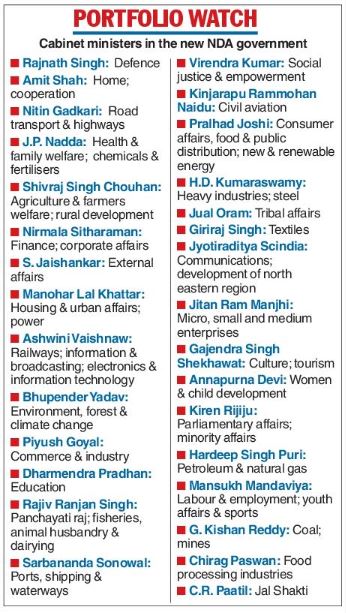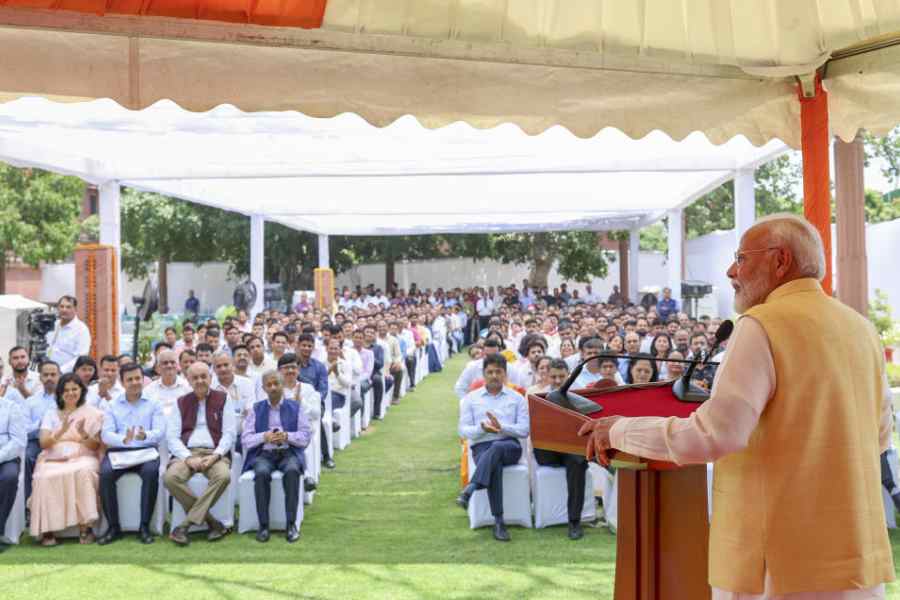Prime Minister Narendra Modi has effected probably his toughest government pick from within a familiar ring of security.
Keen on creating a fine balance between competing NDA ambitions, he has decided not to tinker the slightest with his A team.
Modi on Monday allotted ministry portfolios almost 24 hours after his third government had been sworn in, retaining all the top four ministers in the departments they held in his previous administration while making very little concessions for the allies, barring the TDP.
Rajnath Singh is again the defence minister, Amit Shah remains home minister, Nirmala Sitharaman keeps finance and S. Jaishankar holds on to external affairs.
Nitin Gadkari, deemed not to be a favourite with Modi or Shah, has been retained as road transport and highways minister, appearing to confirm Modi’s reluctance to take any chances at a time of uncertain dependence on allies.
Shivraj Singh Chouhan, another politician perceived as anti-Modi since the Vajpayee-Advani era, has been handsomely compensated for being removed as Madhya Pradesh chief minister. He has been entrusted with two important ministries: agriculture & farmers welfare, and rural development.
This is being seen in BJP circles as an effort by Modi to ensure he does not upset any party senior at a time when his personal authority has been significantly diminished by the poll results, which have denied the BJP a majority of its own.
Modi has, however, sought to underline that he remains in command by giving very little to the allies despite his government banking on their support.
The TDP, with 16 MPs the largest partner in the NDA after the BJP, has been allotted the high-profile civil aviation portfolio but the other partners have been denied any “important” ministry.
The TDP’s 37-year-old MP-elect, Kinjarapu Rammohan Naidu, is civil aviation minister, a portfolio held by Congress defector Jyotiraditya Scindia in the last Modi government.
Nitish Kumar’s JDU, which has 12 MPs, has got panchayati raj as well as fisheries, animal husbandry and dairying, allotted to senior leader Rajiv Ranjan aka Lalan Singh.
Although these departments can prove key to improving the rural economy of backward Bihar, they are no match for the railway ministry which the JDU is believed to have sought. Nitish had held the ministry in a previous NDA government led by Atal Bihari Vajpayee.
In comparison, Jitan Ram Manjhi, whose party Hindustani Awam Morcha Secular won just one seat, has secured a “better” ministry: micro, small and medium enterprises.
JDS leader H.D. Kumarasamy has got the reasonably important heavy industries and steel.
Chirag Paswan of the LJP, with five MPs, has debuted in government with food processing, held by his late father Ram Vilas Paswan in a previous Modi administration.
The BJP has retained all the other key departments. Outgoing party president J.P. Nadda, who has returned to the government, has been given health and family welfare along with chemicals & fertilisers. He was health minister in the first Modi government.
Former Haryana chief minister Manohar Lal Khattar, known as a “friend of Modi”, has emerged as a big winner. He has two key portfolios: housing & urban affairs plus power.
Dharmendra Pradhan, who was aspiring to the chief ministership of Odisha, has been retained as education minister, crucial to furthering the BJP’s ideological push among students.
Another big gainer is Ashwini Vaishnaw, who has retained the railways and electronics & information technology while being entrusted with the government’s publicity department, the ministry of information and broadcasting.
In the last government, this ministry was held by Anurag Singh Thakur, who has been dropped despite returning to the Lok Sabha for a fifth term.
Annapurna Devi, promoted to cabinet rank from junior minister, is in charge of women and child development, formerly held by Smriti Irani, who has lost from Amethi.
C.R. Paatil, the Gujarat BJP chief elevated to the government after proving his organisational acumen by scripting the party’s big victory in the last Assembly polls, has been rewarded with jal shakti, critical to Modi’s rural thrust.
Piyush Goyal, who contested a Lok Sabha election for the first time and won from Mumbai South, remains minister for commerce and industry. Sarbanand Sonowal, the former Assam chief minister, retains ports, shipping and waterways.
Changes
Mansukh Mandaviya, seen as Modi’s blue-eyed boy from his home state of Gujarat, has lost the health portfolio but gained labour and employment in addition to youth affairs and sports.
Scindia, who has lost the civil aviation ministry to the TDP, has been handed communication along with the ministry of development of the northeast region, both lower in profile than his last assignment.
Rajasthan leader Gajendra Singh Sekhawat, who held the jal shakti ministry, has been shifted to culture and tourism.
Kiren Rijiju is the new parliamentary affairs minister, a challenging assignment that entails managing Parliament at a time when a stronger Opposition is straining at the leash to corner the government.
Rijiju, who is from Arunachal Pradesh, has also been given charge of minority affairs.
G. Kishan Reddy, the Telangana BJP chief credited with doubling the party’s tally in the southern state, has got the important coal and mines ministry. In the previous government, he held culture and tourism.
On Day One after assuming office for a third term, Modi sought to make an outreach to the farmers and the poor, the BJP’s seat losses having come mostly from the rural areas.
He signed a routine file to release the 17th instalment of the cash dole to farmers, a scheme started ahead of the 2019 Lok Sabha polls, while playing it up as evidence of his commitment to farmers.
“Our government is committed to making the lives of our farmer brothers and sisters across the country easier. It is a matter of good fortune for me that after assuming office as the Prime Minister for the third consecutive time, I have got the opportunity to do my first work for them,” Modi posted on X.
The first meeting of the new cabinet was held at Modi’s official residence, but till then the ministers didn’t know what portfolios they had been allotted.
The first decision taken by the cabinet was to build 3 crore more houses for the poor under the PM’s housing scheme, a commitment widely publicised during the election campaign.












